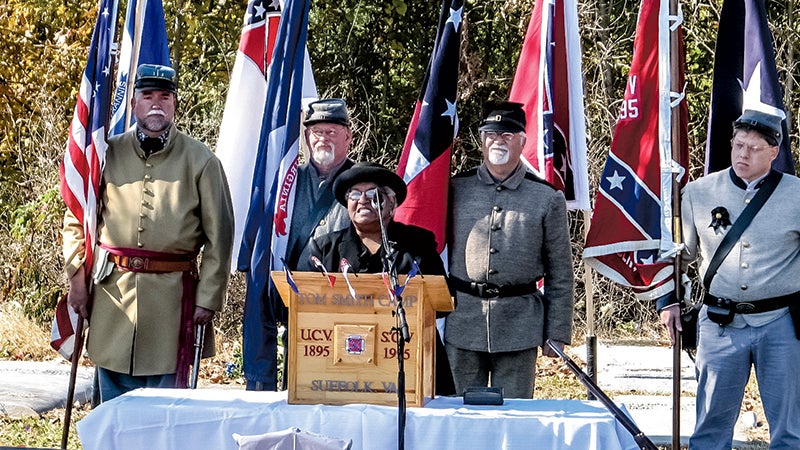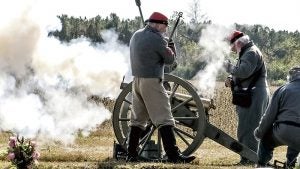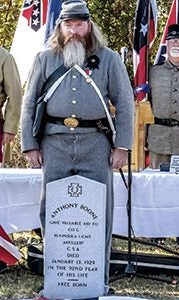Marker dedicated for black Confederate
Published 8:35 pm Saturday, November 12, 2016

- Katherine Boone Hamilton speaks at a ceremony to unveil a headstone dedicated to her great-uncle, Anthony Boone, at Skeetertown Cemetery on Saturday.
More than 100 people of all skin tones gathered Saturday to honor a Confederate veteran who was receiving a headstone for the first time, more than 87 years after his death.
Anthony Boone enlisted in 1862 and served with the Peninsula Light Artillery. His service took him to Lamberts Point, Portsmouth, Towne Point, Suffolk, Richmond, Manassas and Gordonsville.
But unlike most people’s idea of a Confederate soldier, Boone was black — born free as a direct descendant of Joe Skeeter, the European land surveyor for whom the Skeetertown area was named.
“The decision to serve with the South baffled some,” said Katherine Boone Hamilton, the great-great-niece of Anthony Boone. Her great-grandfather, Jason Boone, Anthony’s brother, also served with the Confederacy.
Saturday’s ceremony took place at the Skeetertown Cemetery, established and cared for by the Missionary Lodge No. 1, which is still in existence today. The lodge members cared for the sick and buried the dead, Hamilton said, and you still have to be a lodge member to be buried there.
The cemetery is located on Pitt Road, off Skeetertown Road. Many of the graves bear the Boone name, and now there is one more stone with the Boone name added to the list.
Joe Skeeter settled in Skeetertown, as it came to be known, in the 1700s. His daughter, Betsy Skeeter, had two interracial marriages, one to a free black, according to Hamilton.
Her daughter, in turn, also married a free black, John Boone. They were the parents of Anthony and Jason Boone, the Confederate soldiers. One brother, William, served in the war with the U.S. Colored Troops.
“It really was brother against brother, and it didn’t make any difference whether they were white or black,” said Frank Earnest, heritage defense coordinator for the Virginia Division of the Sons of Confederate Veterans.
Earnest said the reason blacks in the South would have taken up arms against the North is simple.
“What is so different about the black Confederate soldier? Absolutely nothing,” he said. “They came together in defense of their native land.”
Hamilton began her quest nearly two decades ago, when she learned her great-grandfather served in the Confederacy. She contacted Lee Hart of the Tom Smith Camp of the Sons of Confederate Veterans, and he helped her obtain a gravestone for Jason Boone. That was in 1999.
Since then, she has also wanted to honor her great-great-uncle, Anthony Boone, for his service.

The Knibbs Battery gives a cannon salute during the dedication of a headstone for a Confederate soldier in Skeetertown Cemetery on Saturday.
“He stayed until the end, when pay and food were scarce,” she said.
Flags fluttered at the Skeetertown Cemetery Saturday as the new stone was unveiled, wreaths were placed, and Confederate re-enactors gave salutes with muskets and a cannon. More than a dozen members of the extended Boone family were present.
Opel Simmons III, the great-great-great-grandson of Jason Boone, said the idea of his family members serving in the Confederacy has taken some getting used to.
“It was a bit of reconciling history with modern-day feelings,” he said. While many are taught to put the Civil War in terms of black versus white, “They were defending what they knew to be their home,” he said.
Earl Ijames, curator of the North Carolina Museum of History, was guest speaker for the event. He said he has spent a lot of time researching “colored” Confederates — those of American Indian and mixed ancestry as well as blacks, he said — and educating people on their existence. He presented a longleaf pine to the group.
Hamilton, having seen her goal completed, said the ceremony was “wonderful.”
Mike Pullen, lieutenant commander of the Army of Northern Virginia, said the Boone brothers are part of the Confederate family.
“Anthony Boone is one of the many men who is part of all of our family,” he said.






